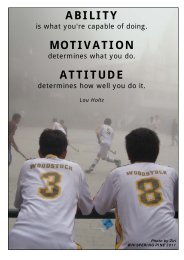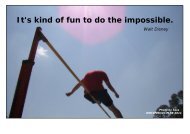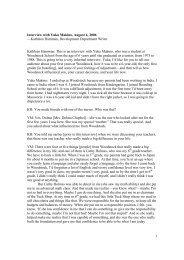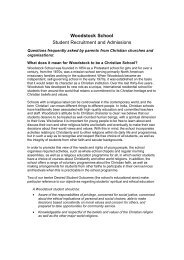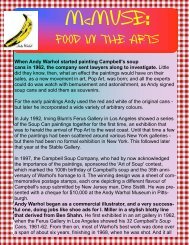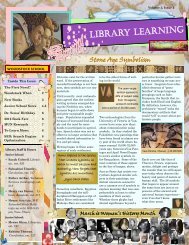Setting the Scene Educational Vision - Woodstock School
Setting the Scene Educational Vision - Woodstock School
Setting the Scene Educational Vision - Woodstock School
Create successful ePaper yourself
Turn your PDF publications into a flip-book with our unique Google optimized e-Paper software.
Eliciting Greatness<br />
An <strong>Educational</strong> <strong>Vision</strong> for <strong>Woodstock</strong> <strong>School</strong><br />
<strong>Setting</strong> <strong>the</strong> <strong>Scene</strong><br />
Every organization has a destiny - a deep purpose that expresses its reason for being. This<br />
sense of purpose can become tacit – obscured by daily routines and unquestioned<br />
culture. Our educational vision must allow us to remain attentive to this deep purpose<br />
amidst <strong>the</strong> busy schedules of day to day life and <strong>the</strong> inevitable tyranny of <strong>the</strong> urgent.<br />
This vision must also remind us that we strive to deal with challenges, decisions and<br />
pressures according to our values. Nothing that is done should be haphazard. Everything we<br />
do must be carefully thought out with reference to our basic aims and developed from first<br />
principles. Whenever new problems or questions arise we seek <strong>the</strong>ir solution within <strong>the</strong><br />
same context. We ask ourselves. “Is <strong>the</strong> solution proposed consistent with our vision”<br />
Some of this vision can be drawn from <strong>the</strong> strength and depth of <strong>Woodstock</strong>’s past. These<br />
are <strong>the</strong> principles which have stood <strong>the</strong> test of time and represent <strong>the</strong> firm underpinnings of<br />
our founding vision. O<strong>the</strong>r aspects of this vision must look forward to those values and<br />
principles which need to accompany our hopes and strategies into <strong>the</strong> future. These will<br />
draw on <strong>the</strong> best that we now know about how learning occurs, <strong>the</strong> insights of psychology,<br />
cognitive science and educational research.<br />
<strong>Educational</strong> <strong>Vision</strong><br />
Where <strong>the</strong>re is no vision <strong>the</strong> people perish. Proverbs<br />
The cultural critic, Neil Postman, commented, “Our children are <strong>the</strong> living messages we send<br />
to a time we will not see.” So, too, are our graduates – carrying with <strong>the</strong>m into an unknown<br />
future whatever we consider to be of value. Our students inherit a complex world<br />
characterized by change and crisis. Must <strong>the</strong>y take <strong>the</strong> world as it is, merely accepting an<br />
education that enables <strong>the</strong>m to fit into <strong>the</strong> status quo, or can <strong>the</strong>y learn to question what<br />
<strong>the</strong>y see and strive for a deeper understanding It is hardly a sign of health if an education<br />
merely allows young people to adapt to life in a dysfunctional society.<br />
A depressing history has accumulated around decades of so called innovation in education.<br />
Coupled with <strong>the</strong> invasion of managerial jargon and production line terminology has come<br />
an ever more secular view of what it is to be human. Functional, clinical and essentially arid,<br />
<strong>the</strong>se influences have sent out ripples which have rearranged <strong>the</strong> entire landscape of our<br />
lives. The priorities of community and relationship are easily surrendered to <strong>the</strong> bland<br />
corporate agenda of economy, efficiency and effectiveness. The fluid language of <strong>the</strong> soul<br />
does not flow well through <strong>the</strong>se dehydrated valleys.<br />
Endless tinkering with superficial things reveals less and less of what can really inspire us.<br />
We know more about techniques and strategy than ever before. We have every gimmick at<br />
Page | 1
Eliciting Greatness<br />
An <strong>Educational</strong> <strong>Vision</strong> for <strong>Woodstock</strong> <strong>School</strong><br />
our disposal. The outer form of what we do has reached <strong>the</strong> limits of refinement. We have<br />
used everything we know to explore <strong>the</strong> boundaries and have ended up nowhere better<br />
than where we began. As Thoreau put it, “Our inventions are wont to be pretty toys, which<br />
distract our attention from serious things. They are but improved means to an unimproved<br />
end, an end which it was already but too easy to arrive at.” Many who inhabit this planet<br />
are wealthier and healthier than ever before but happiness seems to have retreated to a far<br />
horizon. Promised results have eluded us. Many institutions and communities have<br />
experiences of this malaise. Internalizing its logic leads only to despair. At <strong>the</strong> root is a<br />
moral and spiritual backwardness which has failed to keep pace with our scientific and<br />
technological ‘advances’. Acknowledging this is <strong>the</strong> starting point to a different path. It is a<br />
path which looks back as much as it looks forward. It is an approach rooted in <strong>the</strong><br />
restoration of <strong>the</strong> human soul at <strong>the</strong> heart of life and meaning.<br />
I believe in education – but not in <strong>the</strong> sense of a lot that goes on in <strong>the</strong> name of education<br />
today. For me, education is a wider, fuller and infinitely richer thing. It is about what we<br />
referred to at <strong>the</strong> Staff Retreat as “soul-making” - shaping young lives, confronting <strong>the</strong><br />
destructive modern patterns of materialism and self-centeredness and showing young<br />
people how to live what <strong>the</strong> ancient philosophers called <strong>the</strong> ‘good life’. This is a view closer<br />
to <strong>the</strong> ‘monastery’ than <strong>the</strong> ‘market place’ but as schools have moved from <strong>the</strong> former to<br />
<strong>the</strong> latter <strong>the</strong>y have lost significantly more than <strong>the</strong>y have gained.<br />
What follows is intended to give a sense of what determines my priorities and what I chose<br />
to measure and, <strong>the</strong>refore, attribute value to in <strong>the</strong> world of education. These are <strong>the</strong><br />
principles from which I my approach to education:<br />
Education should emerge from clear philosophical and spiritual<br />
underpinnings.<br />
“The most important fact about <strong>the</strong> subject of education is that <strong>the</strong>re is no such thing. Education is not a<br />
subject, and it does not deal in subjects. It is instead <strong>the</strong> transfer of a way of life.” G.K. Chesterton<br />
Amiel’s dictum, “Every life is a profession of faith, and exercises an inevitable and silent<br />
propaganda,” reminds us that <strong>the</strong>re is no neutral position which can be adopted in any<br />
human activity. It is not difficult to show that every educational philosophy is built upon<br />
some <strong>the</strong>ological foundation or ano<strong>the</strong>r. <strong>Woodstock</strong> has always looked to its founding<br />
Christian vision as a source of inspiration and guidance. This vision provides a translucent<br />
framework of values which informs a view of what it is to be human, what it is to be<br />
educated and what it means to live life to <strong>the</strong> full. In modern parlance, we would call this a<br />
“narrative”. It is this narrative or story which should give purpose and meaning to a<br />
<strong>Woodstock</strong> education.<br />
I believe that without a spiritual dimension, education too easily sustains narratives which<br />
only support economic utility, getting a better job, consumerism, comfort or success for its<br />
Page | 2
Eliciting Greatness<br />
An <strong>Educational</strong> <strong>Vision</strong> for <strong>Woodstock</strong> <strong>School</strong><br />
own sake. In this sense, a <strong>Woodstock</strong> education is a form of soul-making – enabling young<br />
people to find those values which will provide meaning, purpose, sustenance and resilience<br />
at <strong>the</strong> very deepest levels of <strong>the</strong>ir awareness. This education is not merely about acquiring<br />
knowledge and correlating facts; it is, essentially, about attaching significance to life.<br />
The rationale for committing to distinct philosophical or metaphysical foundations cannot<br />
only be based on a respect for <strong>the</strong> past. Veneration of history for its own sake is unthinking<br />
traditionalism (and would, amongst o<strong>the</strong>r things, venerate blood-letting over penicillin!).<br />
The values enshrined in <strong>the</strong> teachings of Christ must be seen to provide a robust and<br />
compelling approach to education – its pedagogy and goals – which can assert its relevance<br />
in <strong>the</strong> 21st century. Of course, <strong>the</strong>se values will not always be compatible with <strong>the</strong> values of<br />
business or industry - nor with <strong>the</strong> values of modern societies or even of conventional<br />
educational wisdom. In fact, <strong>the</strong>se values may actively and aggressively challenge many<br />
approaches to education, organization and decision-making – for <strong>the</strong>y emerge from a very<br />
different narrative to that which inspires many features of modern society.<br />
This commitment to <strong>the</strong> teachings of Christ as <strong>the</strong> source of institutional and educational<br />
values is not to suggest that <strong>Woodstock</strong> is like a church or a community of faith. <strong>Woodstock</strong><br />
is an educational institution – a school – and our deep commitments must find <strong>the</strong>ir most<br />
au<strong>the</strong>ntic expression in ways which are appropriate to that setting. These include <strong>the</strong><br />
quality of daily life, relationships, interactions and community engagement. A true valuing<br />
of <strong>the</strong> spiritual in a school context is measured in <strong>the</strong> power of what is practiced ra<strong>the</strong>r than<br />
what is preached. That being <strong>the</strong> case, gentleness, humility, forgiveness and love must<br />
inform our pedagogy as much as insights from psychology and cognitive science.<br />
Education should take place within a compassionate and caring<br />
community.<br />
It takes a village to raise a child. African proverb<br />
I value a community which encourages open-mindedness and courteous freedom of<br />
expression and one in which everyone can expect to be treated honestly, fairly and with<br />
respect. But why is that What’s so special about a compassionate and caring community<br />
We now know far more about <strong>the</strong> defining characteristics of an environment within which<br />
teaching and learning is effective and productive. What is significant is that it is precisely<br />
this type of environment which is also likely to promote meaningful personal, moral and<br />
spiritual growth.<br />
The foundations of this approach are based on a commitment to strong personal, emotional<br />
and psychological care. In our mechanistic worldviews, still dominated by Newtonian mindsets,<br />
we can struggle to truly comprehend and trust <strong>the</strong> mysterious alchemy which shapes<br />
<strong>the</strong> character and personality of <strong>the</strong> child. Our preoccupation with control and fascination<br />
with models of development dominated by <strong>the</strong> cognitive element ignores a more ancient<br />
Page | 3
Eliciting Greatness<br />
An <strong>Educational</strong> <strong>Vision</strong> for <strong>Woodstock</strong> <strong>School</strong><br />
and far simpler wisdom. Cultivating a community in which young people experience love<br />
and integrity, discipline and clarity, will nurture roots of self-knowledge and confidence far<br />
deeper than any we can contrive.<br />
Quality relationships lie at <strong>the</strong> heart of a nurturing environment within which <strong>the</strong> nobler<br />
aims of <strong>the</strong> school can be more readily achieved. The ingredients of this relationship are not<br />
necessarily synonymous with professional qualifications or techniques alone – important<br />
though <strong>the</strong>y are in <strong>the</strong> provision of a sound education. The heart of this relationship is<br />
found in <strong>the</strong> compelling power of openness, integrity, honesty and <strong>the</strong> transformation that<br />
comes from relating to o<strong>the</strong>rs as ‘persons’. As Goe<strong>the</strong> put it, “we only truly learn from<br />
those we love.”<br />
These emphases will find practical expression in a warm, supportive and friendly<br />
environment – one characterized by civility, respect and attentive listening. It will be one in<br />
which capricious discipline, insult and bullying are absent. Only within this kind of<br />
environment can <strong>the</strong> greater educational goals of <strong>the</strong> school be achieved. As such, each<br />
member of staff is engaged in this same process and <strong>the</strong>ir ability to help young people begin<br />
this journey is significantly determined by <strong>the</strong>ir own commitment to personal growth and<br />
spiritual discovery.<br />
This raises questions about <strong>the</strong> “kinds” of people who are able to educate effectively. We<br />
focus much on <strong>the</strong> what, when, how and why of education – much more rarely on <strong>the</strong><br />
“who” (who does <strong>the</strong> educating, what are <strong>the</strong> personal qualities <strong>the</strong>y should be<br />
characterized by). The over-riding quality of <strong>the</strong> educator should be what I would describe<br />
as a certain “seriousness” about <strong>the</strong>ir own journey, a depth of questioning about<br />
<strong>the</strong>mselves and <strong>the</strong> world and a sensitivity to <strong>the</strong> spiritual dimension of experience – for<br />
what <strong>the</strong> teacher is, that <strong>the</strong> teacher imparts. It is unquestionably <strong>the</strong> ‘narrow path’ and <strong>the</strong><br />
‘difficult way’ for it places remarkable demands on those who chose to live by its rule.<br />
Gentleness, kindness and a willingness to be vulnerable are <strong>the</strong> most reliable qualities any<br />
teacher can bring with <strong>the</strong>m to <strong>the</strong>ir vocation – and <strong>the</strong>se can only be expected from <strong>the</strong><br />
strong. The consequences of holding onto less reliable things are, in <strong>the</strong> long-run,<br />
profoundly destructive - as Rumi warned his followers: “If you’re here unfaithfully with us,<br />
you’re causing terrible damage.” It takes faith to hold onto that which is ultimately valuable<br />
in education. Weakness tempts us to depend upon o<strong>the</strong>r less significant things – discipline,<br />
measurement, control, formality and outward appearance to name but a few. These false<br />
gods extract costly sacrifices of time and energy from <strong>the</strong>ir devotees. <strong>Woodstock</strong> is still free<br />
from this dull bureaucratic liturgy - and <strong>the</strong> benefits are real. This includes a freedom to<br />
sacrifice time and energy to those things which are of great value and which, frankly, cannot<br />
be weighed or measured – compassion for <strong>the</strong> troubled and vulnerable, a relentless<br />
commitment to care (which though often inconspicuous is, never<strong>the</strong>less, powerful) and <strong>the</strong><br />
Page | 4
Eliciting Greatness<br />
An <strong>Educational</strong> <strong>Vision</strong> for <strong>Woodstock</strong> <strong>School</strong><br />
encouragement to make discoveries outside <strong>the</strong> boxes of a syllabus or exam paper. This is<br />
‘whole person’ learning at its best - innovative, challenging, personal and profoundly<br />
spiritual.<br />
Education requires <strong>the</strong> balanced development of <strong>the</strong> whole person.<br />
It should come as no surprise that <strong>the</strong> unhealthiness of our world today is in direct proportion to our inability to<br />
see it as a whole. Peter M. Senge<br />
Many of <strong>the</strong> great headmasters of <strong>the</strong> late 19th century sought to develop what <strong>the</strong>y<br />
described as “<strong>the</strong> whole man” in <strong>the</strong>ir respective schools. Though our terminology has<br />
changed, we can recognize in this aspiration an aim which is as relevant in <strong>the</strong> 21st century.<br />
This is to sustain an approach to education which seeks to nurture development across a<br />
wide variety of domains. It acknowledges that <strong>the</strong> success of an education cannot only be<br />
located in intellectual achievement, cognitive development or examination success.<br />
Harvard Graduate <strong>School</strong> of Education Professor Howard Gardner’s ground-breaking <strong>the</strong>ory<br />
of Multiple Intelligences reveals that <strong>the</strong>re is more than one “intelligence”. Each person has<br />
a unique combination of interpersonal, intrapersonal, linguistic, ma<strong>the</strong>matical, musical,<br />
artistic, kines<strong>the</strong>tic, and naturalist “intelligences”. Taking account of this through a<br />
genuinely broad and balanced curriculum (Capital “C”) allows students to find, express and<br />
develop <strong>the</strong>ir varied intelligences or faculties beyond those achievements measured in SAT<br />
scores. What is more, it is evident that those students who make <strong>the</strong> most of <strong>the</strong>ir potential<br />
in a variety of ways are more likely to make significant contributions to a world that values<br />
talents of all kinds.<br />
In <strong>the</strong> 20th century <strong>the</strong> renowned educator, Kurt Hahn, had a significant impact in this<br />
endeavor. Not only did he found two great schools but he also created <strong>the</strong> Outward Bound<br />
Organization, <strong>the</strong> United World Colleges and <strong>the</strong> International Award for Young People. To<br />
honor his 80th birthday, <strong>the</strong> Heads of eleven schools who were ei<strong>the</strong>r alumni or former<br />
teachers under Hahn, founded <strong>the</strong> Round Square, a global movement whose goal is to<br />
develop every student into a whole person through a diversity of structured educational<br />
experiences. I believe we need to take very careful account of Hahn’s thinking at<br />
<strong>Woodstock</strong>. I am also especially keen for us to seek membership of <strong>the</strong> Round Square<br />
organization.<br />
Achieving this balance requires that our approach to education encourages an integrated<br />
development of potential across a range of dimensions, including <strong>the</strong> spiritual, academic,<br />
moral, aes<strong>the</strong>tic, emotional, social and physical. This is precisely why we need to create a<br />
sense of what I have called <strong>the</strong> curriculum Capital “C” – an approach which recognises,<br />
records and rewards student engagement in a range of learning environments and<br />
experiences.<br />
However, a busy accumulation of various activities and academic subjects does not make up<br />
Page | 5
Eliciting Greatness<br />
An <strong>Educational</strong> <strong>Vision</strong> for <strong>Woodstock</strong> <strong>School</strong><br />
a ‘whole’ educational package no matter how many fragments are crammed into <strong>the</strong> mould.<br />
What we end up with is a busy approach ra<strong>the</strong>r than a holistic or balanced approach. Yes, it<br />
is about creating an environment in which young people have opportunities to encounter<br />
different forms of knowledge and a wide range of learning experiences. But it is also about<br />
allowing a sense of balance to emerge from <strong>the</strong> calm of reflection. The IB’s Theory of<br />
Knowledge course is a good example of an approach designed to achieve this. It supports<br />
students in becoming aware of <strong>the</strong> interpretative nature of knowledge, including personal<br />
ideological biases and promotes a sense of coherence, enabling students to apply <strong>the</strong>ir<br />
knowledge with greater awareness. In <strong>the</strong> absence of deliberate opportunities to nurture<br />
coherence and integration, education risks fragmentation, imbalance and unexamined bias.<br />
Education should be challenging, engaging and experiential.<br />
“Tell me, and I will forget. Show me, and I may remember. Involve me, and I will understand.” Confucius<br />
This requires <strong>the</strong> learner to take initiative, make decisions, and to be accountable for <strong>the</strong><br />
results, through investigating, experimenting, being curious, solving problems and assuming<br />
responsibility. All that we now know about <strong>the</strong> learning process supports an approach in<br />
which <strong>the</strong> teacher is <strong>the</strong> facilitator and not <strong>the</strong> performer. It is all about seeking <strong>the</strong><br />
teachable moment, offering enough challenge for young people to be drawn out of <strong>the</strong>ir<br />
individual comfort zones into <strong>the</strong> realm of self-directed discovery and insight. To achieve<br />
this, <strong>the</strong> spaces we create (literally and figuratively) must be safe and capable of eliciting <strong>the</strong><br />
learners’ potential – enabling energy and opportunity to combine in pursuit of possibility.<br />
One of Hahn’s schools was founded with <strong>the</strong> motto, ‘Plus est en vous’. In o<strong>the</strong>r words,<br />
“<strong>the</strong>re is more in you than you think”. <strong>Woodstock</strong>’s approach to education should enable<br />
young people to realize this transforming truth and to have opportunities to act upon it.<br />
Young people need to experience success if <strong>the</strong>y are to build confidence. But it is also<br />
important for <strong>the</strong>m to be supported in learning from <strong>the</strong>ir failures. This combination of<br />
challenge and support should exist in and out of <strong>the</strong> classroom. At various times and in<br />
different contexts, each student – from <strong>the</strong> most able to <strong>the</strong> least able – will find <strong>the</strong>mselves<br />
in need of challenge or support in order to maintain <strong>the</strong> optimal conditions for learning. On<br />
all occasions, our interaction with young people begins from where <strong>the</strong>y are at ra<strong>the</strong>r than<br />
from where we want <strong>the</strong>m to be. This is what Vygotsky termed “<strong>the</strong> zone of proximal<br />
development” – that zone in which <strong>the</strong> possibility of learning is maximized. This is precisely<br />
<strong>the</strong> point at which adult intervention is most likely to encourage real learning – for it is <strong>the</strong><br />
point at which <strong>the</strong> individual student has reached <strong>the</strong> limits of <strong>the</strong>ir unaided progress.<br />
Assessing exactly what combination of challenge and support is appropriate is not easy. We<br />
all wear o<strong>the</strong>r people’s faces at times. As Jung described it, we conceal our true nature<br />
behind protective layers of identity and self-image. We can easily make <strong>the</strong> mistake of<br />
dealing with o<strong>the</strong>rs in terms of <strong>the</strong> facades <strong>the</strong>y present – we are taken in by <strong>the</strong>m and<br />
conned into believing that what we see is <strong>the</strong> same as what lies within. We see <strong>the</strong><br />
Page | 6
Eliciting Greatness<br />
An <strong>Educational</strong> <strong>Vision</strong> for <strong>Woodstock</strong> <strong>School</strong><br />
dismissive arrogance of <strong>the</strong> adolescent and mistake this for <strong>the</strong> real person who cowers<br />
behind <strong>the</strong> mask. These defensive layers protect <strong>the</strong> frail and timid individual struggling to<br />
come to terms with <strong>the</strong>ir identity and <strong>the</strong> turmoil of change so characteristic of <strong>the</strong> teenage<br />
years. Naively, we can fall for <strong>the</strong> illusion and respond to <strong>the</strong> youngster on <strong>the</strong> basis of <strong>the</strong><br />
shallow and superficial persona. This forces <strong>the</strong> fragile ‘self’ even fur<strong>the</strong>r into <strong>the</strong> security of<br />
<strong>the</strong>ir façade. It also runs <strong>the</strong> risk of reinforcing in <strong>the</strong> young person a sense of self-worth<br />
based upon <strong>the</strong> shallow features of <strong>the</strong>ir mask. The best education, like <strong>the</strong> best pastoral<br />
care, recognizes <strong>the</strong> masks and sees <strong>the</strong> clues - and clues, by definition, are coded and must<br />
be deciphered.<br />
Education must offer opportunities for young people to show initiative and<br />
develop self-discipline.<br />
Treat a man as he is, he will remain so. Treat a man <strong>the</strong> way he can be and ought to be, and he will become<br />
as he can be and should be. Goe<strong>the</strong><br />
We want young people to become self-disciplined individuals who make informed decisions<br />
– about this <strong>the</strong>re will be little disagreement. The question is not ‘what do we want to<br />
achieve’ but ‘how on earth do we get it’ We know that many factors influence a young<br />
person’s personal development. We also know that <strong>the</strong> internalization of values is different<br />
to external compliance prompted by rules and punishments. In o<strong>the</strong>r words, <strong>the</strong>re is a big<br />
difference between control and self-discipline. We don’t simply want young people who<br />
know about self-discipline – we want individuals who will actually behave in self-disciplined<br />
ways!<br />
We take for granted a differentiated approach to academic learning. We would never think<br />
of setting up a math’s program that treated every student exactly <strong>the</strong> same! Yet, we set up<br />
approaches to <strong>the</strong> personal development of students which, it seems, does exactly that. We<br />
fail to take account of <strong>the</strong> fact that students function at different levels or stages of selfdiscipline<br />
and personal growth.<br />
Lawrence Kohlberg’s work on <strong>the</strong> moral and social development of children offers some<br />
important clues. Over many years Kohlberg studied stages of moral reasoning in young<br />
people from a variety of cultural, social and national backgrounds. He established a crucial<br />
fact; everyone, regardless of culture, race or sex, goes through stages of development.<br />
Although <strong>the</strong> progression from stage to stage is <strong>the</strong> same, <strong>the</strong> rate varies from person to<br />
person. It is for this reason that we need an approach to personal development which takes<br />
account of different levels within <strong>the</strong> same age cohorts.<br />
The school’s rules set <strong>the</strong> basic minimum standards that all members of <strong>the</strong> community are<br />
expected to adhere to. Our aim is to help young people move from external rule-keeping<br />
towards more internalized forms of initiative and self-discipline. <strong>Woodstock</strong> students must<br />
learn to think for <strong>the</strong>mselves. Critical thinking skills and a healthy skepticism will enable<br />
Page | 7
Eliciting Greatness<br />
An <strong>Educational</strong> <strong>Vision</strong> for <strong>Woodstock</strong> <strong>School</strong><br />
<strong>the</strong>m to gain meaningful independence of thought. Where possible, privilege should be<br />
linked with responsibility and maturity. Age alone should not be seen as <strong>the</strong> automatic rite<br />
of passage from one set of freedoms to ano<strong>the</strong>r. Students should recognize that privilege<br />
and greater personal freedom are <strong>the</strong> corollary of developing responsibility, self-knowledge<br />
and self-discipline. Those who show maturity and responsibility should be progressively<br />
freed from petty restrictions.<br />
What seems clear is that young people cannot successfully internalize qualities of selfdiscipline<br />
by being ‘talked into <strong>the</strong>m’. Nor is a consistently assertive and controlled<br />
environment going to foster <strong>the</strong>se qualities. Students need to become accustomed to <strong>the</strong>m<br />
through a process of progressive experiences from <strong>the</strong> earliest years. It is not enough to<br />
talk in abstract terms about how much we value self-discipline. If we only show our respect<br />
for <strong>the</strong>se qualities in token ways we breed cynicism ra<strong>the</strong>r than real internalization.<br />
Participation must be real and include actual experience and responsibility which allows<br />
progressive development to occur.<br />
If we want an environment that ensures greater control, a ‘one size fits all’ approach will<br />
suffice. If we want an environment that will allow self-discipline to flourish, we will need a<br />
differentiated approach as far as our work with students is concerned. This will mean<br />
actively looking for opportunities for students to practice personal initiative, self-discipline<br />
and responsibility, to manage risk and embrace challenge. Where appropriate, <strong>the</strong>se<br />
opportunities should always be supported by a reassuring adult presence.<br />
Education should take place within a diverse school community.<br />
"Through o<strong>the</strong>rs, we become ourselves." L. S. Vygotsky<br />
Albert Einstein once observed that “<strong>the</strong> problems that exist in <strong>the</strong> world today cannot be<br />
solved by <strong>the</strong> level of thinking that created <strong>the</strong>m.” There is something uniquely valuable<br />
about a diverse school community- and especially a residential one in which students live<br />
and work toge<strong>the</strong>r in a close community 24/7. There are many ways to define “diversity’ –<br />
for example, from passport and nationality to colour, creed, culture, caste, socio-economic<br />
background and language. However we choose to define it, it is only in <strong>the</strong> presence of<br />
diversity that we become aware of our own identities. When we are surrounded by<br />
characteristics which match and mirror our own we can become strangely blind to our own<br />
distinctive baggage.<br />
In a diverse <strong>Woodstock</strong> ‘village’ young people can come to discover a common humanity<br />
which transcends <strong>the</strong> divisions of wealth, culture, religion and ethnic identity which so often<br />
characterise <strong>the</strong> conflicts and problems in <strong>the</strong> world today. These divisions often represent<br />
<strong>the</strong> level of thinking at which many of <strong>the</strong> world’s problems were originally created. Etched<br />
on <strong>the</strong> stone of <strong>the</strong> Martin Lu<strong>the</strong>r King Memorial in Washington DC, are words which<br />
dramatically sum up <strong>the</strong> challenge of education in <strong>the</strong> 21st century: “If we are to have peace<br />
Page | 8
Eliciting Greatness<br />
An <strong>Educational</strong> <strong>Vision</strong> for <strong>Woodstock</strong> <strong>School</strong><br />
on earth our loyalties must become ecumenical ra<strong>the</strong>r than sectional. Our loyalties must<br />
transcend our race, our class and our nation. And this means we must develop a world<br />
perspective.”<br />
We must enable our students to develop <strong>the</strong> skills of global understanding and critical<br />
thinking. Their ability to be agents of change in <strong>the</strong> world will depend upon this. We will<br />
definitely need a robust scholarship program to allow us to pro-actively recruit for diversity<br />
(in every sense of <strong>the</strong> word). For it is from our innovative use of diversity, as a powerful and<br />
deliberate resource, that <strong>Woodstock</strong> students will discover possibilities beyond old levels of<br />
thinking. It is only by living and working toge<strong>the</strong>r, facing challenges toge<strong>the</strong>r and sharing<br />
experiences of success and failure that those from fundamentally different backgrounds will<br />
learn to understand one ano<strong>the</strong>r.<br />
The main challenge facing education in <strong>the</strong> 21st century is to educate young people for <strong>the</strong><br />
‘real world’ of diversity and difference. Whe<strong>the</strong>r <strong>the</strong>se differences remain as <strong>the</strong><br />
fragmented divisions of hatred and intolerance will depend to a large extent on <strong>the</strong> kind of<br />
education young people receive. An international education offers <strong>the</strong> opportunity to<br />
celebrate diversity in a spirit of understanding and tolerance and to develop a positive<br />
regard and awareness of o<strong>the</strong>r people. This must be one of <strong>the</strong> most important challenges<br />
facing <strong>the</strong> world today - it is certainly a challenge which <strong>Woodstock</strong> students should be able<br />
to face with courage and determination. A real education is one that allows us to seek out<br />
and find what life is all about. It cultivates in us <strong>the</strong> awareness and intelligence which probe<br />
<strong>the</strong> deeper problems and <strong>the</strong> more ultimate questions. And this is only really possible in <strong>the</strong><br />
context of diversity.<br />
Education must develop a clear understanding of leadership and service.<br />
“The place God calls you to is <strong>the</strong> place where your deep gladness and <strong>the</strong> world’s deep hunger meet.”<br />
Frederick Buechner<br />
A compelling vision of education must be orientated towards meaningful action in <strong>the</strong><br />
world. For young idealists, excited by <strong>the</strong> possibility of change, and motivated to act<br />
through personal example, <strong>the</strong>re are real opportunities to make a difference – education<br />
must actively and deliberately support this.<br />
Leadership means different things to different people. For some, it is all about issuing<br />
commands and ordering people about. But <strong>the</strong>re is ano<strong>the</strong>r model of leadership which has<br />
stood <strong>the</strong> test of time as a far more powerful instrument for change. This model defines<br />
leadership as ‘how to be’ ra<strong>the</strong>r than ‘how to do’ and focuses on <strong>the</strong> values and qualities of<br />
character of <strong>the</strong> individual – inspiring a personal vision of greatness which can create<br />
powerful leadership energies. Warren Bennis summed this up well: “people begin to lead<br />
that moment when <strong>the</strong>y decide for <strong>the</strong>mselves how to be.” This view of leadership is about<br />
creating <strong>the</strong> inner conditions and commitments from which positive outer influence can<br />
Page | 9
Eliciting Greatness<br />
An <strong>Educational</strong> <strong>Vision</strong> for <strong>Woodstock</strong> <strong>School</strong><br />
emerge as integrity and trustworthiness. Unless we support (and model) <strong>the</strong> development<br />
of <strong>the</strong>se personal foundations within our students, our leadership techniques and strategies<br />
will be superficial and ineffective – rarely tapping into those energies which can truly inspire<br />
and never eliciting <strong>the</strong> greatness within.<br />
The great spiritual traditions of <strong>the</strong> world have long recognized <strong>the</strong> power of<br />
encouragement, example and service to o<strong>the</strong>rs. This is <strong>the</strong> type of leadership we should<br />
aspire to at <strong>Woodstock</strong>. It is <strong>the</strong> kind of leadership that acts without great fuss and gives<br />
willingly of time and energy. This leadership should be expressed through encouragement,<br />
example and collaborative approaches. All areas should be infused with this sense of what<br />
has been called “servant leadership.” This will be challenging, for as Tim Brighouse noted,<br />
“Some of <strong>the</strong> shared value systems we have are quite pernicious and <strong>the</strong>y can be successful<br />
in a kind of pernicious way. Most of our schools have unspoken assumptions in <strong>the</strong>ir<br />
organization, <strong>the</strong>ir timetable and <strong>the</strong>ir curriculum which reinforce individualism and<br />
materialism, and minimize <strong>the</strong> need for co-operation.”<br />
Student and staff leadership alike should be characterized by this willingness to serve –<br />
sometimes being willing to lead and sometimes being willing to follow. In this way,<br />
leadership and service are two facets of <strong>the</strong> same entity. “The first responsibility of a<br />
leader,” said Max De Pree, “is to define reality. The last is to say thank you. In between, <strong>the</strong><br />
leader is a servant.” There are already many opportunities to express this at <strong>Woodstock</strong> –<br />
including within <strong>the</strong> local community. But to become part of a defining and inspiring<br />
education, <strong>the</strong>se opportunities need to be deeply embedded within <strong>the</strong> heart of <strong>the</strong><br />
institution. “Service-Learning”, as it is known, is strategy that integrates meaningful<br />
opportunities for service with instruction and reflection to enrich <strong>the</strong> learning experience.<br />
We must develop a system of guided self-evaluation which encourages students to reflect<br />
on <strong>the</strong> benefits of <strong>the</strong>ir service-leadership opportunities and to evaluate and integrate <strong>the</strong><br />
understanding and insights acquired with all o<strong>the</strong>r aspects of <strong>the</strong>ir <strong>Woodstock</strong> experience.<br />
Education should embrace <strong>the</strong> outdoors as a significant resource for<br />
learning and personal development.<br />
“Great things are done when men and mountains meet.” William Blake<br />
Joseph Conrad in Lord Jim explains <strong>the</strong> failure of his hero on a very momentous occasion in<br />
his life by saying that “he never was tested in his life by certain experiences which revealed<br />
his inner worth – <strong>the</strong> qualities of his resistance, <strong>the</strong> stuff of his fibre, <strong>the</strong> edge of his temper,<br />
<strong>the</strong> truth of his pretenses to o<strong>the</strong>rs and to himself.”<br />
Allowing students to experience a different context to <strong>the</strong> ones <strong>the</strong>y normally find<br />
<strong>the</strong>mselves in, is a powerful opportunity for learning of a very particular type. This learning<br />
is not just about acquiring new knowledge but a far deeper level of personal understanding.<br />
Kurt Hahn put it bluntly, “It is culpable neglect for educators not to impel young people into<br />
Page | 10
Eliciting Greatness<br />
An <strong>Educational</strong> <strong>Vision</strong> for <strong>Woodstock</strong> <strong>School</strong><br />
health giving experiences.” Hahn believed that <strong>the</strong> skills and confidence to deal with<br />
unfamiliar situations could be developed and learned. Exposure to challenge, in a secure<br />
environment and appropriately reflected upon, can awaken a self-belief and resilience<br />
which can last a whole life long. Little wonder that Kurt Hahn used <strong>the</strong> phrase “Outward<br />
Bound” to describe this program - <strong>the</strong> nautical term to describe a ship leaving <strong>the</strong> safety of<br />
its harbor to head for <strong>the</strong> open seas.<br />
The dictionary defines resilience as “<strong>the</strong> ability to cope with and respond effectively to <strong>the</strong><br />
stresses of life or <strong>the</strong> ability to spring back.” Resilience is one of <strong>the</strong> most important<br />
qualities a school can develop in its students. The evidence is compelling – a structured and<br />
committed approach to outdoor education is, par excellence, <strong>the</strong> way to build character and<br />
positive personality traits in young people by developing core values of courage, confidence,<br />
integrity, humanity, team work and resilience.<br />
James Neill’s research at <strong>the</strong> University of New Hampshire confirms that <strong>the</strong> controlled<br />
experience of challenge increases psychological resilience and o<strong>the</strong>r key qualities. Detailed<br />
studies of adventure training programs have suggested that young peoples’ resilience levels<br />
can increase to become up to 300% greater than those found in <strong>the</strong> average population.<br />
Many o<strong>the</strong>r studies have shown that by encountering <strong>the</strong> edges of our physical and<br />
psychological limits we increase our capacity to deal with everyday life. I am convinced that,<br />
in <strong>the</strong> context of education, <strong>the</strong> outdoors is more than just a way of providing interesting<br />
activities or a chance to enjoy <strong>the</strong> scenery. Outdoor education enables young people to<br />
realize <strong>the</strong>ir potential, to learn about <strong>the</strong>mselves and see clearly, perhaps for <strong>the</strong> first time,<br />
what <strong>the</strong>y might be capable of achieving in life<br />
Achieving this goal entails temporary discomfort and accepting <strong>the</strong> challenge of deferred<br />
gratification – nei<strong>the</strong>r of <strong>the</strong>se are <strong>the</strong> instinctive choices of any teenager. The former<br />
requires no small measure of firmness on <strong>the</strong> part of <strong>the</strong> school whilst <strong>the</strong> latter requires a<br />
fair amount of faith on <strong>the</strong> part of <strong>the</strong> student (probably firmness and faith from parents!).<br />
But when it comes to preparing for <strong>the</strong> challenges of life, an ounce of prevention in <strong>the</strong> form<br />
of resilience is worth more than a pound of cure. As an ancient Japanese proverb puts it,<br />
“fall seven times, stand up eight.”<br />
Education must cultivate a responsible relationship with <strong>the</strong> natural<br />
environment.<br />
Our youth should dwell in <strong>the</strong> land of health amid fair sights and sounds; and beauty will meet <strong>the</strong> sense like a<br />
breeze and insensibly draw <strong>the</strong> soul even in childhood into harmony with <strong>the</strong> beauty of reason. Plato<br />
The relationship between education and <strong>the</strong> natural environment is a fascinating one. I<br />
have no doubt that an education which takes place in an urban setting is qualitatively<br />
different to that which takes places amidst <strong>the</strong> beauty and splendor of nature. Plato’s take<br />
on this was clear, “Our youth should dwell in <strong>the</strong> land of health amid fair sights and sounds;<br />
Page | 11
Eliciting Greatness<br />
An <strong>Educational</strong> <strong>Vision</strong> for <strong>Woodstock</strong> <strong>School</strong><br />
and beauty will meet <strong>the</strong> sense like a breeze and insensibly draw <strong>the</strong> soul even in childhood<br />
into harmony with <strong>the</strong> beauty of reason.”<br />
The influence of <strong>the</strong> environment on education extends beyond <strong>the</strong> natural setting to<br />
include all aspects of <strong>the</strong> physical space within which it occurs – from <strong>the</strong> aes<strong>the</strong>tics of<br />
buildings and spaces to <strong>the</strong> quality of light and color in a room. All of <strong>the</strong>se factors play a<br />
role in shaping <strong>the</strong> “space” within which education takes place and form part of what <strong>the</strong><br />
architectural philosopher, Christopher Alexander, has called <strong>the</strong> “architecture of <strong>the</strong><br />
invisible.” None of this requires plush or exotic physical spaces. Beauty and attention to<br />
aes<strong>the</strong>tics is not incompatible with structures and interiors which are modest, fit for<br />
purpose, easy to maintain and in keeping with contextually and culturally appropriate<br />
norms.<br />
The need to form meaningful relationships with <strong>the</strong> natural environment does not end with<br />
school buildings and <strong>the</strong> infrastructure of a school campus. H.G. Wells warned that we are<br />
“in a race between education and catastrophe.” The environmental challenges of <strong>the</strong> 21st<br />
century demand an approach to education which fosters awareness, critical thinking and<br />
responsibility. Yet education is no barrier to barbarity and recklessness – after all, <strong>the</strong><br />
designers of Auschwitz were <strong>the</strong> heirs of Kant and Goe<strong>the</strong>. None of <strong>the</strong> world’s<br />
environmental problems are <strong>the</strong> work of ignorant people. The world’s environmental<br />
challenges will not be solved by education – but by a certain kind of education. In a<br />
residential school this is an education which can model, with integrity, a credible and<br />
carefully considered approach to <strong>the</strong> natural environment.<br />
In our local context, opportunities to model (ra<strong>the</strong>r than merely “teach”) a responsible<br />
relationship with <strong>the</strong> environment abound – all of which can be connected with an<br />
integrated approach to education – from <strong>the</strong> efficient use of energy to waste management,<br />
recycling and meaningful engagement with neighboring communities. Paolo Freire has<br />
described what he calls <strong>the</strong> “banking model” of education – this is an approach in which<br />
everything is solvable if only <strong>the</strong> right stuff is deposited in children’s heads. Sadly, this has<br />
never been enough. Unless <strong>the</strong> institutions which call <strong>the</strong>mselves schools model integrity<br />
and care towards <strong>the</strong> environment, young people will only learn that <strong>the</strong>y are helpless to<br />
overcome <strong>the</strong> gap between ideals and reality.<br />
All education is environmental education for no education operates from a neutral position.<br />
Unless <strong>the</strong> education we offer models a way of interacting with <strong>the</strong> environment which is<br />
responsible, sustainable and connected, it will only ever reinforce indifference. Indifference<br />
in a global society which spends billions of dollars each year using <strong>the</strong> deceptive tools of<br />
advertising to reinforce consumerism and materialism is a very dangerous thing indeed.<br />
Page | 12
Eliciting Greatness<br />
An <strong>Educational</strong> <strong>Vision</strong> for <strong>Woodstock</strong> <strong>School</strong><br />
Education should encourage a healthy lifestyle to support <strong>the</strong><br />
development of <strong>the</strong> whole person<br />
“The emancipation of our physical nature is in attaining health, of our social being in attaining goodness,<br />
and of our self in attaining love.” Rabindranath Tagore<br />
An old adage says “a healthy mind deserves a healthy body” – but a healthy lifestyle is far<br />
more than just <strong>the</strong> companion to a healthy mind! The physical body is <strong>the</strong> channel through<br />
which so many aspects of personal development are mediated and nurtured. Achieving a<br />
sense of physical harmony through balanced diet, exercise, fresh-air and healthy living is an<br />
important part of achieving balance and integration in o<strong>the</strong>r dimensions too.<br />
Clear policies on smoking and alcohol and a ‘zero tolerance’ policy on drugs are strong<br />
reminders that damaging abuse of <strong>the</strong> physical body cannot be allowed to take place.<br />
Physical Education, sports and outdoor education also play a key role in promoting health<br />
and healthy lifestyles. There are o<strong>the</strong>r ways, too, in which this approach can extend beyond<br />
<strong>the</strong> obvious to include subtle but profound influences on holistic wellbeing. The more<br />
deliberately every aspect of a school community connects with its educational philosophy,<br />
<strong>the</strong> more compelling <strong>the</strong> vision which emerges.<br />
For example, we should recognize that food and <strong>the</strong> services which supply and prepare it<br />
are central to <strong>the</strong> school’s well-being. The approach to food and diet must take account of<br />
<strong>the</strong> fact that a healthy, well-balanced diet is essential to <strong>the</strong> holistic development of <strong>the</strong><br />
individual. Seasonal variation, animal welfare, environmental integrity and <strong>the</strong> social wellbeing<br />
of all those involved in <strong>the</strong> production and supply of food should be taken account of.<br />
Where possible, foods should be whole, fresh and organically grown and obtained from<br />
local suppliers. Where palatable wholegrain and unrefined products exist, <strong>the</strong>y should<br />
replace highly refined and processed alternatives. A balance should be struck between <strong>the</strong><br />
realities of a diverse and multi-cultural community and <strong>the</strong> need to provide an on-going<br />
education in sound eating habits. Food and <strong>the</strong> act of eating must not simply be seen as<br />
fuel for <strong>the</strong> body but part of <strong>the</strong> fabric of our lives and a key component in <strong>the</strong> building of<br />
community and individual well-being.<br />
Healthy lifestyles extend beyond <strong>the</strong> basics of food and exercise to include spiritual,<br />
emotional and psychological well-being. Providing young people with a credible model from<br />
which <strong>the</strong>y can live <strong>the</strong>ir lives to <strong>the</strong> full ought to be part of a <strong>Woodstock</strong> education. This<br />
must enable young people to experience and appreciate balance in <strong>the</strong>ir own lives –<br />
learning to recognize <strong>the</strong> need for rest and calm to balance periods of great effort and<br />
intensity.<br />
“All man’s miseries,” wrote <strong>the</strong> philosopher Pascal, “derive from not being able to sit quietly<br />
in a room alone.” In our busy lives where <strong>the</strong> tyranny of <strong>the</strong> urgent dictates a frenzied pace<br />
we easily lose sight of this simple truth. Quaker schools have long recognized <strong>the</strong> great<br />
Page | 13
Eliciting Greatness<br />
An <strong>Educational</strong> <strong>Vision</strong> for <strong>Woodstock</strong> <strong>School</strong><br />
value of shared silence as central to <strong>the</strong> spiritual life of <strong>the</strong> community. Silence rinses<br />
external attractions from our attention and forces us to look inwards. It is in <strong>the</strong> silence of<br />
stillness and reflection that we open ourselves to a truth that only ever whispers to us – for<br />
only when <strong>the</strong> mind and body are stilled can <strong>the</strong> voice of God be heard. The practice of<br />
shared silence can be a powerful discipline. As <strong>the</strong> great Sufi poet Rumi wrote, “Only let <strong>the</strong><br />
moving waters calm down, and <strong>the</strong> sun and moon will be reflected on <strong>the</strong> surface of your<br />
being.”<br />
Page | 14



